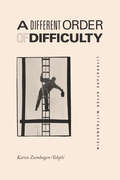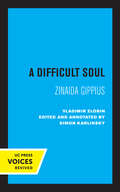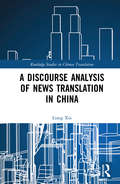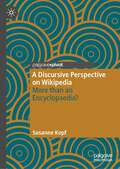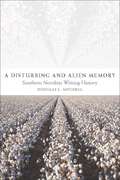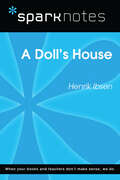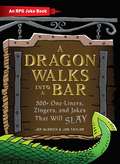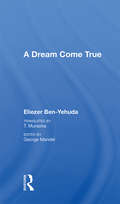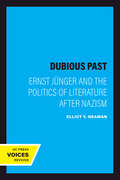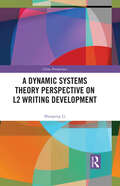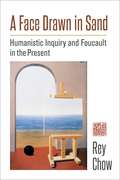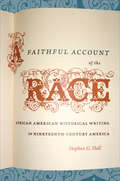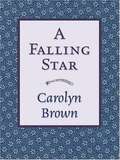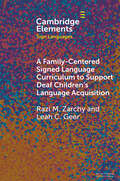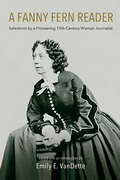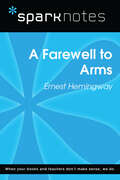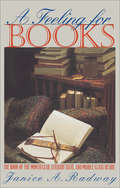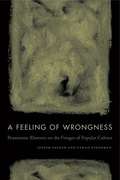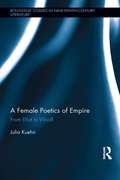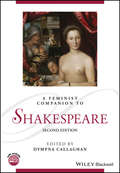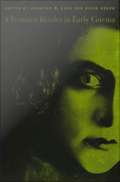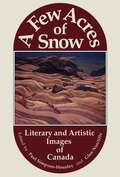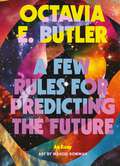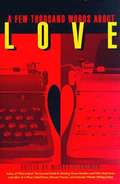- Table View
- List View
A Different Order of Difficulty: Literature after Wittgenstein
by Karen Zumhagen-YekpléIs the point of philosophy to transmit beliefs about the world, or can it sometimes have higher ambitions? In this bold study, Karen Zumhagen-Yekplé makes a critical contribution to the “resolute” program of Wittgenstein scholarship, revealing his Tractatus Logico-Philosophicus as a complex, mock-theoretical puzzle designed to engage readers in the therapeutic self-clarification Wittgenstein saw as the true work of philosophy. Seen in this light, Wittgenstein resembles his modernist contemporaries more than might first appear. Like the literary innovators of his time, Wittgenstein believed in the productive power of difficulty, in varieties of spiritual experience, in the importance of age-old questions about life’s meaning, and in the possibility of transfigurative shifts toward the right way of seeing the world. In a series of absorbing chapters, Zumhagen-Yekplé shows how Kafka, Woolf, Joyce, and Coetzee set their readers on a path toward a new way of being. Offering a new perspective on Wittgenstein as philosophical modernist, and on the lives and afterlives of his indirect teaching, A Different Order of Difficulty is a compelling addition to studies in both literature and philosophy.
A Difficult Soul: Zinaida Gippius
by Vladimir Zlobinguide the Symbolist movement which dominated Russian literature for the first third of the twentieth century. A major poet, important playwright, and influential literary critic, she was also a sexual rebel who rejected traditional male/female roles as early as the 1890s. Vladimir Zlobin, her secretary and factotum from the time of her emigration to Paris after the revolution until her death in 1945, exposes the consequential inner workings of the literary circle around Gippius. His account of her three most important personal involvements--with her husband, the novelist and critic Dmitry Merezhkovsky; with the unattainable love of her life, the critic Dmitry Filosofov; and with the Devil, with whom she believed herself in personal contact--facilitates the task of understanding this truly "difficult soul." Himself a poet, Zlobin also offeres a detailed commentary on her poetry, and persuasively connects it to her personal and mystical experiences. In Karlinsky's perceptive introduction, Gippius emerges not only as one of the principals in the Modernist renascence of Russian poetry between 1890 and 1930, but as a figure of considerable historical interest, whose views, life, and work stand in significant relation to the major social, sexual, religious, and political currents of her time. This title is part of UC Press's Voices Revived program, which commemorates University of California Press's mission to seek out and cultivate the brightest minds and give them voice, reach, and impact. Drawing on a backlist dating to 1893, Voices Revived makes high-quality, peer-reviewed scholarship accessible once again using print-on-demand technology. This title was originally published in 1980.
A Discourse Analysis of News Translation in China (Routledge Studies in Chinese Translation)
by Liang XiaA Discourse Analysis of News Translation in China offers hitherto underexplored inroads into Chinese media through insider perspectives on a unique Chinese newspaper, Cankao Xiaoxia which not only is the largest circulating newspaper in China but is also unique in that its news consists entirely of stories translated from foreign news sources. The size of the publication, the unique nature of the publication, and the view from the inside of such an organization gathered through interviews with its employees give this proposed book a highly unique perspective that will inform our understanding of the workings of Chinese media in important ways.
A Discursive Perspective on Wikipedia: More than an Encyclopaedia?
by Susanne KopfThis book provides a concise yet comprehensive guide to Wikipedia for researchers and students of linguistics, discourse and communication studies, redressing the gap in research on Wikipedia in these fields and encouraging scholars to explore Wikipedia further as a platform and a medium. Drawing on Herring's situational and medium factors, as well as related developments in (critical) discourse studies, the author studies the online encyclopaedia both theoretically and empirically, examining its origins, production and consumption before turning to a discussion of its societal significance and function(s). This book will be of interest to Wikipedia scholars from a range of disciplines, as well as those with a broader interest in linguistics, discourse studies and the digital humanities.
A Disturbing and Alien Memory: Southern Novelists Writing History (Southern Literary Studies)
by Douglas L. MitchellIn the late nineteenth century, as the study of history shifted from the domain of letters into the social sciences, novelists in the North and the West generally turned away from writing history. Many southern novelists and poets, however, continued to undertake historical writing as an extension of their art form. What made southern literary figures differ from their northern and western counterparts? In A Disturbing and Alien Memory, Douglas L. Mitchell addresses this intriguing question by tracing a line of southern writers from the early nineteenth century to the mid-twentieth, finding that an obsessive need to defend the South and the oft-noted "rage to explain" drove some creative writers to continue to make forays into history and biography in an effort to enter a more public sphere where they could more decisively influence interpretations of the past. In the Romantic history of the nineteenth century, Mitchell explains, men of letters saw themselves as keepers of memory whose renderings of the past could help shape the future of the nation. He explores the historical writing of William Gilmore Simms to trace the failure of Romantic nationalism in the growing split between North and South, then turns to Thomas Nelson Page's effort to resurrect the South as a "spiritual nation" with a redeemed history after the Civil War. Mitchell juxtaposes their work with that of William Wells Brown, the pioneering African American historian and novelist who used the authority of history to write blacks into the American story. Moving into the twentieth century, Mitchell analyzes the historical component of the Southern Agrarian project, focusing on the tension between modernist aesthetics and polemical aims in Allen Tate's Civil War biographies. He then traces a path toward a viable historical vision, Robert Penn Warren's recovery of a tragic understanding, and the creation of a compelling historical art in the work of Shelby Foote. Throughout, Mitchell examines the peculiar dilemma of southern writers, the changing nature of history and its relation to the realm of letters, and the question of public authority, shedding light on several neglected texts in the process -- including Simms's The Sack and Destruction of Columbia, S.C., Brown's The Negro in the American Rebellion, Tate's Jefferson Davis, and Warren's John Brown. Offering a new perspective on a perennial debate in southern letters, A Disturbing and Alien Memory provides a critical framework for a neglected genre in the southern literary canon.
A Doll's House (SparkNotes Literature Guide Series)
by SparkNotesA Doll's House (SparkNotes Literature Guide) by Henrik Ibsen Making the reading experience fun! Created by Harvard students for students everywhere, SparkNotes is a new breed of study guide: smarter, better, faster.Geared to what today's students need to know, SparkNotes provides:chapter-by-chapter analysis explanations of key themes, motifs, and symbols a review quiz and essay topics Lively and accessible, these guides are perfect for late-night studying and writing papers.
A Dragon Walks Into a Bar: An RPG Joke Book
by Jon Taylor Jef AldrichThis hilarious collection of over 300 puns, one-liners, and classic jokes dedicated to the fun of RPGs is perfect for you share with your fellow gaming compatriots!Why don&’t dragons like to eat paladins? They taste lawful. Laugh out loud at over 300 zingy one-liners and eye-rolling puns with this collection of tabletop-based humor, dedicated to the fun of RPGs like Dungeons and Dragons, Pathfinder, and more! A Dragon Walks into a Bar gives you hours of funny content that will keep you smiling. Whether you use them as inspiration for your level 20 comedian bard to crack wise during battle or if you just want a giggle in between turns, this book has everything you&’ve been looking for.
A Dream Come True
by Eliezer Ben-yehudaEliezer Ben-Yehuda (1858-1922), a Russian Jew, was the leader of the movement to revive the Hebrew language-the only attempt we know of that succeeded in restoring an archaic language to use in everyday speech. This memoir is an account of his life until 1882, a year after he settled in Jerusalem, it contains a description of his early life in the
A Dubious Past: Ernst Jünger and the Politics of Literature after Nazism (Weimar and Now: German Cultural Criticism #19)
by Elliot Y. NeamanA Dubious Past examines from a new perspective the legacy of Ernst Jünger (1895-1998), one of the most fascinating figures in twentieth-century German intellectual life. From the time he burst onto the literary scene with The Storms of Steel in the early 1920s until he reached Olympian age in a reunited Germany, Jünger's writings on a vast range of topics generated scores of controversies. In old age he became a cultural celebrity whose long life mirrored the tragic twists and turns of Germany's most difficult century.Elliot Neaman's study reflects an impressive investigation of published and unpublished material, including letters, interviews, and other media. Through his analysis of Jünger's work and its reception over the years, he addresses central questions of German intellectual life, such as the postwar radical conservative interpretation of the Holocaust, divided memory, German identity, left and right critiques of civilization, and the political allegiances of the German and European political right. A Dubious Past reconceptualizes intellectual fascism as a sophisticated critique of liberal humanism and Marxism, one that should be seen as coherent and—for a surprising number of contemporary intellectuals—all too attractive.
A Dynamic Systems Theory Perspective on L2 Writing Development (China Perspectives)
by Shaopeng LiFrom the perspective of empirical complex dynamic systems, this book investigates the complex and nonlinear process of L2 writing centering on three linguistic aspects of L2 writing development: vocabulary, syntax, and discourse.Combining dynamic systems theory, variation analysis, as well as data and cases studies from Chinese EFL learners’ writing, the book critically engages with the heated discussion on dynamic patterns of L2 writing development that focus heavily on the linguistic dimensions of complexity, accuracy, and fluency. The author expands the scope of the research by integrating both linguistic and functional dimensions of L2 output and examines the interaction and co-development of these dimensions. This framework helps delineate a full picture of individual learners’ L2 writing dynamic patterns across all components of their communicative repertoire. The research findings suggest the developmental path of writing system for each EFL learner may differ, which is influenced by their different learning characteristics and learning environments in China.The title will appeal to scholars interested in applied linguistics and second language acquisition. Suggestions on pedagogy and language learning advanced in the book will also make it a useful read for L2 language learner and TESOL and TEFL teachers.
A Face Drawn in Sand: Humanistic Inquiry and Foucault in the Present
by Rey ChowLeadership, innovation, diversity, inclusiveness, sharing, accountability—such is the resounding administrative refrain we keep hearing in the contemporary Western university. What kinds of benefits does this refrain generate? For whom? What discursive incitements undergird such benefits? Although there are innumerable discussions of Michel Foucault in the English-speaking academy, seldom is his work used systematically to unravel the dead ends and potentialities of humanistic inquiry as embedded in these simple but dynamic questions.Rey Chow takes up this challenge by articulating the plight of the humanities in the age of global finance and neoliberal mores through a resharpened focus on Foucault’s concept “outside.” This general discussion is followed by a series of micro-arguments about several loosely linked topics: the biopolitics of literary study, visibilities and invisibilities, race and racism, sound/voice/listening, and confession and self-entrepreneurship. Against what she polemicizes as the moralistic-entrepreneurial norming of knowledge production, Chow foregrounds a nonutilitarian approach, stressing anew the intellectual and pedagogical objectives fundamental to humanistic inquiry: How to process, analyze, and evaluate different types of texts across languages and disciplines; how to form and sustain viable arguments; how to rethink familiar problems through less known as well as very well-known sources, figures, and methods. Above all, she asks in an abidingly humanistic spirit, how not to know all the answers before the questions have been posed.
A Faithful Account of The Race
by Stephen G. HallThe civil rights and black power movements expanded popular awareness of the history and culture of African Americans. But, as Stephen Hall observes, African American authors, intellectuals, ministers, and abolitionists had been writing the history of the black experience since the 1800s. With this book, Hall recaptures and reconstructs a rich but largely overlooked tradition of historical writing by African Americans. Hall charts the origins, meanings, methods, evolution, and maturation of African American historical writing from the period of the Early Republic to the twentieth-century professionalization of the larger field of historical study. He demonstrates how these works borrowed from and engaged with ideological and intellectual constructs from mainstream intellectual movements including the Enlightenment, Romanticism, Realism, and Modernism. Hall also explores the creation of discursive spaces that simultaneously reinforced and offered counternarratives to more mainstream historical discourse. He sheds fresh light on the influence of the African diaspora on the development of historical study. In so doing, he provides a holistic portrait of African American history informed by developments within and outside the African American community.
A Family-Centered Signed Language Curriculum to Support Deaf Children's Language Acquisition (Elements in Sign Languages)
by Razi M. Zarchy Leah C. GeerDeaf children experience language deprivation at alarmingly high rates. One contributing factor is that most are born to non-signing hearing parents who face insurmountable barriers to learning a signed language. This Element presents a case for developing signed language curricula for hearing families with deaf children that are family-centered and focus on child-directed language. Core vocabulary, functional sentences, and facilitative language techniques centered around common daily routines allow families to apply what they learn immediately. Additionally, Deaf Community Cultural Wealth (DCCW) lessons build families' capacity to navigate the new terrain of raising a deaf child. If early intervention programs serving the families of young deaf children incorporate this type of curriculum into their service delivery, survey data suggest that it is both effective and approachable for this target population, so the rates of language deprivation may decline.
A Fanny Fern Reader: Selections by a Pioneering Nineteenth-Century Woman Journalist
by Fanny FernIn the middle of the nineteenth century, the highest paid and most famous newspaper writer in the US was a woman known to the world as Fanny Fern, the nom de plume of Sara Payson Willis. A Fanny Fern Reader features a selection of Fern's columns, mostly from her years as a weekly columnist for the New York Ledger, along with an introduction that shares the remarkable story of Fern's perseverance and success as a woman in a male-dominated profession. For readers in her own time, Fern's frank and unbridled social commentary and boldly satirical voice made her a household name. Fern's subversive and witty commentary about social mores, gender roles, childhood, authorship, and family life transcend time and continue to resonate with and entertain readers today. A Fanny Fern Reader is the most extensive collection of Fern's newspaper writings to date and includes several works that have been out of print for over a century, making this author's writing on a wide range of issues accessible for readers within and outside of classrooms and academic settings.
A Farewell to Arms (SparkNotes Literature Guide Series)
by SparkNotesA Farewell to Arms (SparkNotes Literature Guide) by Ernest Hemingway Making the reading experience fun! Created by Harvard students for students everywhere, SparkNotes is a new breed of study guide: smarter, better, faster.Geared to what today's students need to know, SparkNotes provides:chapter-by-chapter analysis explanations of key themes, motifs, and symbols a review quiz and essay topics Lively and accessible, these guides are perfect for late-night studying and writing papers.
A Feeling for Books
by Janice A. RadwayDeftly melding ethnography, cultural history, literary criticism, and autobiographical reflection, A Feeling for Books is at once an engaging study of the Book-of-the-Month Club's influential role as a cultural institution and a profoundly personal meditation about the experience of reading. Janice Radway traces the history of the famous mail-order book club from its controversial founding in 1926 through its evolution into an enterprise uniquely successful in blending commerce and culture. Framing her historical narrative with writing of a more personal sort, Radway reflects on the contemporary role of the Book-of-the-Month Club in American cultural history and in her own life. Her detailed account of the standards and practices employed by the club's in-house editors is also an absorbing story of her interactions with those editors. Examining her experiences as a fourteen-year-old reader of the club's selections and, later, as a professor of literature, she offers a series of rigorously analytical yet deeply personal readings of such beloved novels as Marjorie Morningstar and To Kill a Mockingbird. Rich and rewarding, this book will captivate and delight anyone who is interested in the history of books and in the personal and transformative experience of reading.
A Feeling of Wrongness: Pessimistic Rhetoric on the Fringes of Popular Culture
by Joseph Packer Ethan StonemanIn A Feeling of Wrongness, Joseph Packer and Ethan Stoneman confront the rhetorical challenge inherent in the concept of pessimism by analyzing how it is represented in an eclectic range of texts on the fringes of popular culture, from adult animated cartoons to speculative fiction.Packer and Stoneman explore how narratives such as True Detective, Rick and Morty, Final Fantasy VII, Lovecraftian weird fiction, and the pop ideology of transhumanism are better suited to communicate pessimistic affect to their fans than most carefully argued philosophical treatises and polemics. They show how these popular nondiscursive texts successfully circumvent the typical defenses against pessimism identified by Peter Wessel Zapffe as distraction, isolation, anchoring, and sublimation. They twist genres, upend common tropes, and disturb conventional narrative structures in a way that catches their audience off guard, resulting in belief without cognition, a more rhetorically effective form of pessimism than philosophical pessimism.While philosophers and polemicists argue for pessimism in accord with the inherently optimistic structures of expressive thought or rhetoric, Packer and Stoneman show how popular texts are able to communicate their pessimism in ways that are paradoxically freed from the restrictive tools of optimism. A Feeling of Wrongness thus presents uncharted rhetorical possibilities for narrative, making visible the rhetorical efficacy of alternate ways and means of persuasion.
A Feeling of Wrongness: Pessimistic Rhetoric on the Fringes of Popular Culture
by Joseph Packer Ethan StonemanIn A Feeling of Wrongness, Joseph Packer and Ethan Stoneman confront the rhetorical challenge inherent in the concept of pessimism by analyzing how it is represented in an eclectic range of texts on the fringes of popular culture, from adult animated cartoons to speculative fiction.Packer and Stoneman explore how narratives such as True Detective, Rick and Morty, Final Fantasy VII, Lovecraftian weird fiction, and the pop ideology of transhumanism are better suited to communicate pessimistic affect to their fans than most carefully argued philosophical treatises and polemics. They show how these popular nondiscursive texts successfully circumvent the typical defenses against pessimism identified by Peter Wessel Zapffe as distraction, isolation, anchoring, and sublimation. They twist genres, upend common tropes, and disturb conventional narrative structures in a way that catches their audience off guard, resulting in belief without cognition, a more rhetorically effective form of pessimism than philosophical pessimism.While philosophers and polemicists argue for pessimism in accord with the inherently optimistic structures of expressive thought or rhetoric, Packer and Stoneman show how popular texts are able to communicate their pessimism in ways that are paradoxically freed from the restrictive tools of optimism. A Feeling of Wrongness thus presents uncharted rhetorical possibilities for narrative, making visible the rhetorical efficacy of alternate ways and means of persuasion.
A Female Poetics of Empire: From Eliot to Woolf (Routledge Studies in Nineteenth Century Literature)
by Julia KuehnMany well-known male writers produced fictions about colonial spaces and discussed the advantages of realism over romance, and vice versa, in the ‘art of fiction’ debate of the 1880s; but how did female writers contribute to colonial fiction? This volume links fictional, non-fictional and pictorial representations of a colonial otherness with the late nineteenth-century artistic concerns about representational conventions and possibilities. The author explores these texts and images through the postcolonial framework of ‘exoticism’, arguing that the epistemological dilemma of a ‘self’ encountering an ‘other’ results in the interrelated predicament to find poetic modalities – mimetic, realistic and documentary on the one hand; romantic, fantastic and picturesque on the other – that befit an ‘exotic’ representation. Thus women writers did not only participate in the making of colonial fictions but also in the late nineteenth-century artistic debate about the nature of fiction. This book maps the epistemological concerns of exoticism and of difference – self and other, home and away, familiarity and strangeness – onto the representational modes of realism and romance. The author focuses exclusively on female novelists, travel writers and painters of the turn-of-the-century exotic, and especially on neglected authors of academically under-researched genres such as the bestselling novel and the travelogue.
A Feminist Companion to Shakespeare
by Dympna CallaghanThe question is not whether Shakespeare studies needs feminism, but whether feminism needs Shakespeare. This is the explicitly political approach taken in the dynamic and newly updated edition of A Feminist Companion to Shakespeare. Provides the definitive feminist statement on Shakespeare for the 21st century Updates address some of the newest theatrical andcreative engagements with Shakespeare, offering fresh insights into Shakespeare's plays and poems, and gender dynamics in early modern England Contributors come from across the feminist generations and from various stages in their careers to address what is new in the field in terms of historical and textual discovery Explores issues vital to feminist inquiry, including race, sexuality, the body, queer politics, social economies, religion, and capitalism In addition to highlighting changes, it draws attention to the strong continuities of scholarship in this field over the course of the history of feminist criticism of Shakespeare The previous edition was a recipient of a Choice Outstanding Academic Title award; this second edition maintains its coverage and range, and bringsthe scholarship right up to the present day
A Feminist Reader in Early Cinema
by Jennifer M. Bean Diane NegraA Feminist Reader in Early Cinema marks a new era of feminist film scholarship. The twenty essays collected here demonstrate how feminist historiographies at once alter and enrich ongoing debates over visuality and identification, authorship, stardom, and nationalist ideologies in cinema and media studies. Drawing extensively on archival research, the collection yields startling accounts of women's multiple roles as early producers, directors, writers, stars, and viewers. It also engages urgent questions about cinema's capacity for presenting a stable visual field, often at the expense of racially, sexually, or class-marked bodies. While fostering new ways of thinking about film history, A Feminist Reader in Early Cinema illuminates the many questions that the concept of "early cinema" itself raises about the relation of gender to modernism, representation, and technologies of the body. The contributors bring a number of disciplinary frameworks to bear, including not only film studies but also postcolonial studies, dance scholarship, literary analysis, philosophies of the body, and theories regarding modernism and postmodernism. Reflecting the stimulating diversity of early cinematic styles, technologies, and narrative forms, essays address a range of topics--from the dangerous sexuality of the urban flneuse to the childlike femininity exemplified by Mary Pickford, from the Shanghai film industry to Italian diva films--looking along the way at birth-control sensation films, French crime serials, "war actualities," and the stylistic influence of art deco. Recurring throughout the volume is the protean figure of the New Woman, alternately garbed as childish tomboy, athletic star, enigmatic vamp, languid diva, working girl, kinetic flapper, and primitive exotic. Contributors. Constance Balides, Jennifer M. Bean, Kristine Butler, Mary Ann Doane, Lucy Fischer, Jane Gaines, Amelie Hastie, Sumiko Higashi, Lori Landay, Anne Morey, Diane Negra, Catherine Russell, Siobhan B. Somerville, Shelley Stamp, Gaylyn Studlar, Angela Dalle Vacche, Radha Vatsal, Kristen Whissel, Patricia White, Zhang Zhen
A Few Acres of Snow: Literary and Artistic Images of Canada
by Paul Simpson-Housley Glen NorcliffeIn 1759, Voltaire in Candide referred to Canada as "quelques arpents de neige." For several centuries, the image prevailed and was the one most frequently used by poets, writers, and illustrators. Canada was perceived and portrayed as a cold, hard, and unforgiving land. this was not a land for the fainthearted. Canada has yieled its wealth only reluctantly, while periodically threatening life itself with its displays of fury. Discovering its beauty and hidden resources requires patience and perseverance. A Few Acres of Snow is a colletion of twenty-two essays that explore, from the geographer’s perspective, how poets, artists, and writers have addressed the physical essence of Canada, both landscape and cityscape. "Sense of place" is clearly critical in the works examined in this volume. Included among the book’s many subjects are Hugh MacLennan, Gabrielle Roy, Lucius O’Brien, the art of the Inuit, Lawren Harris, Malcolm Lowry, C.W. Jefferys, L.M. Montgomery, Elizabeth Bishop, Marmaduke Matthews, Antonine Mailet, and the poetry of Japanese Canadians.
A Few Rules for Predicting the Future
by Octavia E. Butler'There's no single answer that will solve all our future problems.There's no magic bullet.Instead there are thousands of answers - at least.You can be one of them if you choose to be'***Honest and wise advice from legendary writer and Afrofuturist pioneer, Octavia E. Butler - for anyone who wants to shape our future into something good.A little book to give or to keep, with stunning new artwork by Manzel Bowman.Based on an essay written in 2000. As timely and prescient today as it was then.
A Few Thousand Words about Love
by Mickey PearlmanMickey Pearlman invited established writers and rising stars to think about that eternally evocative subject. The answer that emerged from these gifted writers is a collection of original memoirs about: a Broadway songwriting grandmother, the adoption of a biracial daughter, the love of a gay man for his aging grandmother, a Chinese father's love letters to the writer's mother, a traumatic but transformative childbirth experience, a love affair with one's wife in Paris, and the familiar sibling rivalry between a toddler and her newborn sister. Like fresh rain falling on time-worn Parisian streets, the writers--Peter Cameron, Ron Carlson, Angela Davis-Gardner, Tim Gautreaux, Myra Goldberg, Brian Hall, Linda Hogan, Caroline Leavitt, Margot Livesey, Elizabeth McCracken, Dennis McFarland, Joyce Carol Oates, Larry O'Connor, Mickey Pearlman, Carolyn See, Katharine Weber, and Shawn Wong--play a contemporary riff on an age-old song.
